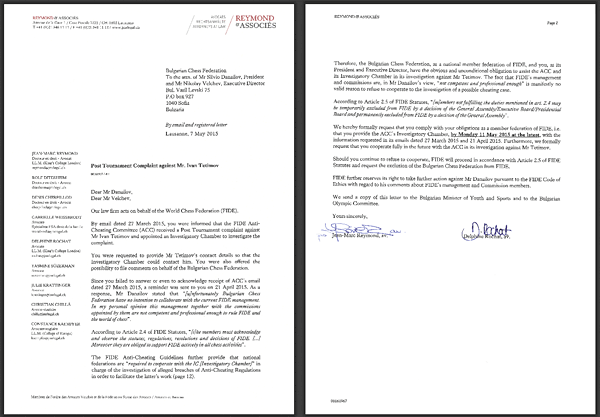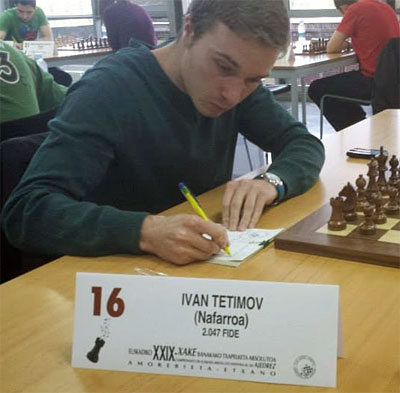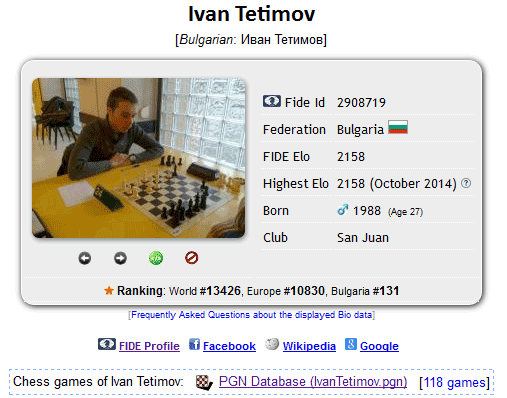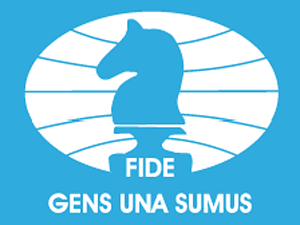This is the letter sent to the Bulgarian Chess Federation by the FIDE law company:


| |
Bulgarian Chess Federation
To the attn. of Mr Silvio Danailov, President and Mr Nikolay Velchev, Executive Director Bul. Vasil Levski 75
P.O box 927
1040 Sofia Bulgaria
By email and registered letter
Lausanne, 7 May 2015
|
Post Tournament Complaint against Mr. Ivan Tetimov
Dear Mr Danailov,
Dear Mr Velchev,
Our law firm acts on behalf of the World Chess Federation (FIDE).
By email dated 27 March 2015, you were informed that the FIDE Anti-Cheating Committee (ACC) received a Post Tournament complaint against Mr Ivan Tetimov and appointed an Investigatory Chamber to investigate the complaint.
You were requested to provide Mr Tetimov’s contact details so that the Investigatory Chamber could contact him. You were also offered the possibility to file comments on behalf of the Bulgarian Chess Federation.
Since you failed to answer or even to acknowledge receipt of ACC’s email dated 27 March 2015, a reminder was sent to you on 21 April 2015. As a response, Mr Danailov stated that “[uJnfortunately Bulgarian Ghess Federation have no intention to collaborate with the current FIDE management. In my personal opinion this management with the commissions appointed by them are not competent and professional enough to rule FIDE and the world of chess”.
According to Article 2.4 of FIDE Statutes, “[t]he members must acknowledge and observe the statutes, regulations, resolutions and decisions of FIDE. [...] Moreover they are obliged to support FIDE actively in all chess activities”.
The FIDE Anti-Cheating Guidelines further provide that national federations are “required to cooperate with the IC [Investigatory Chamber]” in charge of the investigation of alleged breaches of Anti-Cheating Regulations in order to facilitate the latter’s work (page 12).
Therefore, the Bulgarian Chess Federation, as a national member federation of FIDE, and you, as its President and Executive Director, have the obvious and unconditional obligation to assist the ACC and its Investigatory Chamber in its investigation against Mr Tetimov. The fact that FIDE’s management and commissions are, in Mr Danailov’s view, “not competent and professional enough” is manifestly no valid reason to refuse to cooperate to the investigation of a possible cheating case.
According to Article 2.5 of FIDE Statutes, “[m]embers notfulfilling the duties mentioned in art. 2.4 may be temporarily excluded from FIDE by a decision of the General Assembly/Executive Board/Presidential Board and permanently excluded from FIDE by a decision ofthe General Assembly”.
We hereby formally request that you comply with your obligations as a member federation of FIDE, i.e. that you provide the ACC’s Investigatory Chamber, by Monday 11 May 2015 at the latest, with the information requested in its emails dated 27 March ?015 and 21 April 2015. Furthermore, we formally request that you cooperate fully in the future with the ACC in its investigation against Mr Tetimov.
Should you continue to refuse to cooperate, FIDE will proceed in accordance with Article 2.5 of FIDE Statutes and request the exclusion of the Bulgarian Chess Federation from FIDE.
FIDE further reserves its right to take further action against Mr Danailov pursuant to the FIDE Code of Ethics with regard to his comments about FIDE’s management and Commission members.
We send a copy of this letter to the Bulgarian Minister of Youth and Sports and to the Bulgarian Olympic Committee.
Yours sincerely,

This has nothing to do with the FIDE letter, which accuses the Bulgarian Chess Federation of not cooperating with an investigation. However, it is interesting to take a look at the case that set if off. Arbiter Valerio de la Cruz eliminated Tatimov from the Benidorm event, and the Organiser of the tournament, Eftim Stefanov, is quoted as saying:
"Ivan Tetimov, is a young guy from Blagoevgrad, who plays quickly, doesn't much look at the board and looks nervous... and has a relatively low rating that's suspicious, but this is not enough in itself. The first signal I got was from Biser Georgiev, in Round 7. We were ready to search Ivan before or after the game, but we first let them play. Meanwhile, a hi-tech expert I hired came in the hall and scanned the spectrum for frequencies that could be used for transmission of signals. The playing hall was clear, no signals were detected. As the game progressed Ivan turned a pawn down, but saved the endgame and after the draw there was no point to search him. The next round he played against Mario Livaja, who at one point got very nervous because of these symptoms - i.e. the quick play, looking away from the board etc., so he said - "I'm not going to play on if you don't search him".
Although I was sure, that the boy was ok we asked him to come in one of the rooms at the back and he took off his T-shirt. I investigated him, ears, everything and there were no wires to be seen. The guy was quite ok with the inspection, which itself, is a very positive sign. So, he won his game only because Mario decided to go for a win and also Delchev devoted his last class to Tetimovs' games and it's obvious from the analyses that there were both good and bad moves according to Stockfish.'
However, later Mr. Stefanov was still very surprised to discover that a test by Kenneth Regan confirmed the case to be very suspicious. Ken Regan I understand was at pains to point out that this didn't necessarily mean anything in itself.
In El País Spanish journalist Lenotxo Garcia wrote:
Suspicions of cheating with the help of computers have caused mass psychosis and unhealthy tension in tournaments, even one with as wonderful an atmosphere as the Bali Festival of Benidorm, which closed yesterday with 850 participants from 40 countries. The referees saw suspicious signs in the behavior of Bulgarian Ivan Tetímov, 24, and asked permission to inspect his ears. Tetímov that one ear be checked, but not the other; the arbiters, according to the rules, expelled him from the tournament, where he had won the first prize. His departure has raised suspicions: indeed, almost all his moves coincide with those of our "non-human friends". But it is also true that they are very logical and within reach of a player of his level.
The Spanish chess blog Ale Xake Chess has an article entitled "Injusticia con Iván Tetimov" (we assume no translation is needed).

Ivan Tetimov, rated 2047, during the tournament in Benidorm
They report that rumours of cheating arose during the the tournament, in the hall and then on the Internet, which forced the arbiter to do a check. Apparently no device was found – although apparently Tetimov allowed only the examination of one ear. The blogger says he has examined all games by Tetimov in Benidorm and states: "There is no indication he used any program." Here is one example:
Benidorm 2014 Category A final standings
Tournament site for the 2014 Gran Hotel Bali tournament in Benidorm
Quality of games by Ivan Tetimov
| Game (click to view) |
Date
|
Quality
|
| Georgiev, Biser (2233) - Tetimov, Ivan (2158) |
2014.08.29
|
97.96
|
| Tetimov, Ivan (2158) - Daskalov, Dimitar (2260) |
2014.08.28
|
92.06
|
| Dimitrov, Dejan (1970) - Tetimov, Ivan (2158) |
2014.08.27
|
96.67
|
| Tetimov, Ivan (2158) - Bogdanov, Egor (2323) |
2014.08.26
|
90.44
|
| Kuznetsov, Kirill (2150) - Tetimov, Ivan (2158) |
2014.08.25
|
93.94
|
| Tetimov, Ivan (2158) - Ilchov, Rosen (2211) |
2014.08.24
|
91.34
|
| Konstantinidis, Lazaros (1804) - Tetimov, Ivan (2158) |
2013.10.03
|
73.39
|
| Tetimov, Ivan (2158) - Vujacic, Borivoje (2262) |
2013.09.29
|
83.55
|
| Spassov, Liuben (2301) - Tetimov, Ivan (2158) |
2013.09.29
|
53.00
|
| Tetimov, Ivan (2158) - Okov, Mario (1998) |
2013.09.28
|
90.04
|
The quality index is inspired by the work of Matej Guid and Ivan Bratko on analyzing quality of play in chess games. The method compares the moves which were played in a chess game with the ones that a strong chess engine would play. The average difference of the evaluation of the moves played with the ones suggested by the engine is used as the indicator of how "good" the game was played. A summary of the method can be found here. In case you want to do your own investigation, here are eight games played by Tetimov in Benidorm.
* * *
As stated above, all of this is not directly relevant to the FIDE complaint and threat to exclude the Bulgarian Chess Federation. That is for refusing to cooperate in an investigation and for refusing to acknowlege any jurisdiction of FIDE over the national federation – in fact denying the current leadership of FIDE the competence and professionalism to rule FIDE and the world of chess. However, with regard to non-compliance with the request to "provide Mr Tetimov’s contact details so that the Investigatory Chamber could contact him", here is some belated assistance:

All information and contacts can be found on the Chess DB web site
Addendum
Very soon after the notice, given at the top of this report, had been served by FIDE counsel to Silvio Danailov and Nikolay Velchev, the following email was sent to the Anti-Cheating Committee (ACC) for FIDE. The personal details omitted contained in the email have been replaced with xxx.
|
To: FIDE Secretariat, Mr. Israel Gelfer (ACC Chairman), Mr. Yuri Garrett (ACC Secretary),Mrs. Delphine Rochat and Mr. Jean-Marc Reymond (FIDE Lawyers)
May 8, 2015
Dear colleagues,
Dear Mr. Delphine Rochat,
Dear Mr. Jean-Marc Reymond,
We apologize for the delay in our reply towards you request for the details of Mr. Tetimov (initially send by IA Valerio de la Cruz not FIDE or FIDE ACC commission). We would like to inform you that we have not received any reminder of this request on 27.03 and 21.04 to the official e-mail of the Bulgarian Chess Federation (xxx) nor on Mr. Velchev’s (xxx and xxx). Usually FIDE always sends all letters to these e-mails.
We would like to inform you that Bulgarian Chess Federation has strong and unconditional position against any form of cheating in chess and we are fighting against it. We managed to find contact details of Mr. Ivan Tetimov:
Home address: xxx
e-mail: xxx
Mobile: xxx
Kind regards,
Nikolay Velchev
Executive director
Bulgarian Chess federation
|
To this the Anti-Cheating Committee has replied:

Anti-Cheating Committee
Fédération International des Échecs
World Chess Federation
TO WHOM IT MAY CONCERN
Bologna, 11 May 2015
Re:
Post-Tournament Complaint against Mr. Ivan Tetimov - Letter by FIDE counsel to Mr. Danailov and Mr. Velchev (Bulgarian Chess Federation)
This is to inform that, following the notice served by FIDE counsel to Mr. Danailov and Mr. Velchev of the Bulgarian Federation on 7 May 2015, wherein the addressees were requested to comply with their obligations as a Member Federation of FIDE by Monday 11 May 2015, the ACC has since received an e-mail communication by Mr. Velchev with the requested information.
It should be added, however, that in spite of Mr. Deventer’s official request, so far the Bulgarian Federation has not issued any comment on the incident involving Mr. Tetimov.
Finally, and contrary to what Mr. Velchev maintains in his e-mail, the ACC wishes to confirm that the requests of 27 March and 21 April were sent to and correctly received by at least one of the addressees mentioned in Mr. Delchev’s reply - i.e. the e-mail address found on the ECU site under ‘Bulgaria’.
Regards,
Yuri Garrett ACC Secretary
The other Bulgarian scandal (links)
Cheating suspicion at the Zadar Open in Croatia
1/4/2013 – In this event, with 16 GMs and a host of other strong players, one participant stood out especially: the 25-year-old untitled Bulgarian Borislav Ivanov scored 6.0/9 points, with a rating performance of 2697. In the January FIDE list Ivanov has gained 115 points over his previous 2277 rating, gained in over 400 games over three years. A certain suspicion once again raises its ugly head.
Cheating scandal in Croatia – feedback and analysis
1/8/2013 – Recently we reported that the incredibly brilliant play by a 25-year-old untitled Bulgarian player at the Zadar Open in Croatia had raised suspicion that he might have been using illicit electronic assistance during his games. A number of readers criticised us – for linking to the mainstream Croatian media reports?! One of them, an expert in the field, actually analysed all the games in question.
Cheating scandal – Borislav Ivanov speaks out
1/17/2013 – Recently a 25-year-old untitled Bulgarian player scored 6.0/9 points in a strong GM tournament, with a 2697 performance. His opponents complained, he was searched, and no electronic equipment was found. Still, the case put chess on the front pages of the mainstream media, and led to intense discussions on the Internet. Now Ivanov has given the Russian news portal WhyChess an exclusive interview.
A Game of Chicken: Ivanov rides again
3/23/2013 – In the last weeks of 2012 he wowed the chess world with a 2700 performance. Two months later the new Bulgarian star FM Borislav Ivanov finished 88th in the Plovdiv, this time with a performance of 1970. Then came another enviable achievement, a clear win at the Villava rapid (again with a 2700 performance). What is going on? Alex Karaivanov speculates, with new video analysis by Valeri Lilov.
The show goes on: Ivanov in Kustendil
6/3/2013 – Borislav Ivanov is an FM who in the past months has been crushing players hundreds of points stronger than himself. Bulgarian GMs, who suspect computer cheating, are now boycotting tournaments in which he appears, or chosing not to play their games against him. Ivanov has called them antisocial buttheads in newspaper interviews. Alex Karaivanov reports, with new video analysis by Valeri Lilov.
Experts weigh in on Ivanov's performance
6/5/2013 – Two days ago we reported on the crushing victories of a Bulgarian FM against top grandmasters and the suspicion that he was secretly using computer assistance to achieve his success. Extensive analysis of the games by Valeri Lilov made this seem quite plausible. In part two of our series we present the opinions of international experts and one of the GM victims, plus initial reader feeback.
Rombaldoni: "He never calculated moves"
6/19/2013 – The very talented Italian IM Axel Rombaldoni, aiming for a final GM norm, recently travelled to Bulgaria to play in a GM tournament. First he discovered that most of the grandmasters had cancelled their participation, and then in round seven he faced the reason for the cancellation: FM Borislav Ivanov, who has been accused of computer cheating. Alex tells us what it is like to play Ivanov.
Ivanov misses BCF anti-cheating test
7/11/2013 – The Borislav Ivanov saga continues. Recently the wonder chess player agreed to take part in a test, conducted by the Bulgarian Chess Federation, to prove the authenticity of his amazing new-found chess skills. In the end Ivanov simply did not appear at the appointed time. Meanwhile a 12-year-old player, student of a famous coach, was caught cheating, and FIDE is at last stirring into action.
The shoe assistant – Ivanov forfeits at Blagoevgrad
10/3/2013 – Everyone has heard about Borislav Ivanov, a lowly FM from Bulgaria, who since late 2012 has wowed the chess world with super-GM performances. Ivanov was suspected of computer cheating, and forty GMs are boycotting tournaments in which he plays. GM Max Dlugy is not one of them, but he insisted on a thorough check of his opponent before their game. You'll never believe what happened next.
Ivanov ends his chess career
10/5/2013 – On Thursday we reported that FM Borislav Ivanov had forfeited his round seven game after he refused to take off his shoes and allow the arbiter to check for hidden devices. His opponent in that round, GM Maxim Dlugy, provided all the details. Ivanov was permitted to continue in rounds eight and nine, but now has announced that he will retire from chess, as the Bulgarian new outlet Blitz reports.
Ivanov restarts his chess career
12/9/2013 – In early October we reported that Borislav Ivanov had announced that he will retire from chess, after the Bulgarian FM had forfeited a game in the Blagoevgrad Open for refusing to allow the arbiter to check his shoes for hidden devices. Now Ivanov is back at it again: he started the Navalmoral de la Mata Open in Spain with 4.5/5 points, beating two GMs and drawing a third. But then there was, once again, a problem with his shoes.
Ivanov in Navalmoral – the real deal
12/12/2013 – On Monday we published a report on the forfeit and disqualification of Borislav Ivanov at this year's Navalmoral de la Mata Open, after the Bulgarian FM had started with a 4.5/5, beating two GMs in the process. An examination was requested by his round six opponent, and a suspicious device was detected. But Ivanov refused to allow the search to proceed and left the event voluntarily.





























